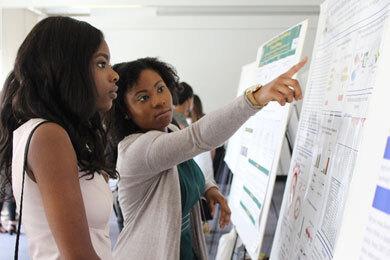
NIH Flickr
Women of Color face many systemic obstacles in the scientific workforce, from experiences of racial microaggressions to disproportionate expectations of academic service relative to their male counterparts. One such obstacle is a lack of speaking opportunities at conferences, colloquia, and other events. Research indicates that women from racial and ethnic groups underrepresented in science (URGs) are given fewer opportunities to present their research at conferences, relative to URG men and non-URGs. This trend remains consistent for academic colloquia, wherein women overall are less likely to be invited as colloquia speakers than their male counterparts. Interestingly, this gender disparity is reduced when colloquia have women chairs and/or members.
Why Does This Matter?
Hearing the voices of Women of Color scientists is important for many reasons. First, speaking engagements and interviews are critical career opportunities. Prestigious presentations tend to solidify a scientist’s reputation, collaboration opportunities, and professional network, thus providing a platform for career advancement and long-term academic success. Disproportionate distribution of these opportunities by race and gender only serves to perpetuate disparities in our scientific workforce and limit the scientific potential of high-quality investigators.
Second, as I discussed in a previous blog post, science identity—the extent to which an individual may categorize themselves as a member of the scientific community—plays a crucial role in shaping the next generation of STEM researchers. In addition to other external and internal factors, the ability to “see oneself” in prestigious and successful academic roles (e.g., as a colloquia speaker) may go a long way towards bolstering science identity among Women of Color.
NIH’s Women of Color Committee: A Case Study in Amplifying URG Voices
The Women of Color (WOC) Committee of the NIH Working Group on Women in Biomedical Careers recognizes that Women of Color may face unique challenges to entering and advancing in biomedical careers—including, as described above, a dearth of opportunities to share both their science and their experiences. To address this challenge, the WOC committee has spearheaded various strategies to amplify the voices of Women of Color scientists, including:
1. Highlighting Women of Color scientists to speak at NIH’s prestigious Wednesday Afternoon Lecture Series, an Office of Intramural Research event that has taken place since the 1950’s. Recent speakers include Omowunmi "Wunmi" Sadik, PhD, a Distinguished Professor and Chair in the Department of Chemistry and Environmental Science at the New Jersey Institute of Technology, and Eve Higginbotham, SM, MD, ML, Professor of Ophthalmology and Vice Dean for Inclusion and Diversity at the University of Pennsylvania.
2. Developing the Women of Color Research Network (WOCRN) to provide Women of Color and their allies with networking opportunities and information about the NIH grants process, advice on career development, and a venue for sharing information.
3. Supporting a Facebook Live discussion hosted by Office of Research on Women’s Health Director Janine Clayton, MD, FARVO, featuring science and stories from Kizzmekia Corbett, PhD, a former senior research fellow at the NIH Vaccine Research Center who recently joined the Harvard T.H. Chan School of Public Health to continue vaccine development research; Rosemarie Ramos, PhD, MPH, a biostatistician for the Defense Health Agency; and Kandice Tanner, PhD, a senior investigator at NCI’s Center for Cancer Research.
4. Supporting and amplifying the work of NIH’s Office of Equity, Diversity, and Inclusion to curate video stories of Women of Color in hopes that women and girls will be inspired, informed, encouraged, and empowered to pursue their own dream of scientific discovery.
Dr. Bernard’s Parting Thoughts
As a leader of the WOC Committee for approaching a decade, I am proud of our group’s commitment to providing consistent pathways for the voices of URG women scientists to be heard at NIH and beyond. Increasing the visibility of outstanding scientists from diverse backgrounds brings us one step closer to achieving the fullest potential of our scientific enterprise.

